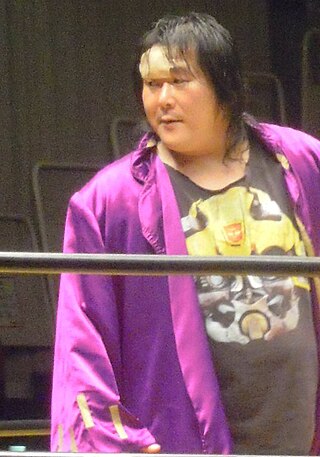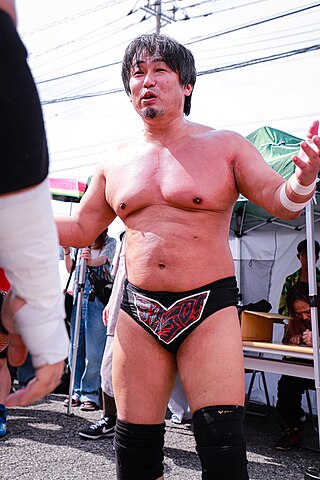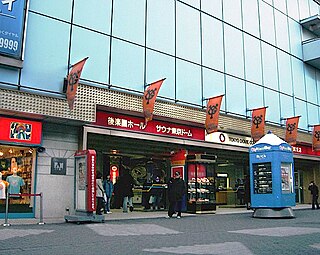
Michael Lee Alfonso was an American professional wrestler. He was best known for his appearances with the American professional wrestling promotions Extreme Championship Wrestling (ECW), World Championship Wrestling (WCW) and the World Wrestling Federation/Entertainment (WWF/E) under the ring name Mike Awesome and for his appearances in Japan with Frontier Martial-Arts Wrestling and All Japan Pro Wrestling as The Gladiator.

Eiji Ezaki was a Japanese professional wrestler, stage actor, musician and professional wrestling promoter, better known under the ring name Hayabusa. He was best known for his time with Frontier Martial-Arts Wrestling (FMW), where he primarily wrestled throughout his career and was the franchise player of the company between 1995 and 2001.

Atsushi Onita is a Japanese actor, politician, and semi-retired professional wrestler. He is best known for his work in Frontier Martial-Arts Wrestling (FMW) and is credited with introducing the deathmatch style of professional wrestling to Japan. He is a former All Asia Tag Team Champions alongside Yoshitatsu.

Masanori Morimura better known under his ring name Ricky Fuji is a Japanese professional wrestler currently signed to Action Advance Pro Wrestling, where he also runs the day-to-day operations. He is perhaps best known for his time with Frontier Martial-Arts Wrestling (FMW), where he wrestled between the promotion's early days in 1990 until the promotion's closure in 2002, making him the longest-tenured wrestler in the company's history.

Yukihiro Kanemura, born Kim Hyeong-ho is a Zainichi Korean retired professional wrestler, better known by the ring name Kintaro Kanemura. He is also known as W*ING Kanemura or Wing Kanemura. He is best known for his death matches in Apache Army, Big Japan Pro Wrestling (BJW), Extreme Championship Wrestling (ECW), Frontier Martial-Arts Wrestling (FMW), International Wrestling Association (IWA) and Wrestling International New Generations (W*ING).

Hiromichi Fuyuki was a Japanese professional wrestler and promoter better known by his ring name Kodo Fuyuki best known for his time in All Japan Pro Wrestling (AJPW), Frontier Martial-Arts Wrestling (FMW), New Japan Pro-Wrestling (NJPW), Wrestle Association R (WAR) and other Japanese and international promotions during the 1980s and 1990s as the leader of 6-man tag team Fuyuki-Gun with Gedo and Jado.

Masashi Honda is a Japanese retired professional wrestler. He is best known for his work in Frontier Martial-Arts Wrestling (FMW) under the ring name Mr. Gannosuke.
Koji Nakagawa is a Japanese semi-retired professional wrestler best known for his work in Frontier Martial-Arts Wrestling (FMW) between 1992 and 2002. He is perhaps best known for his “Hitman” character, heavily inspired by Canadian professional wrestler Bret Hart. Nakagawa also wrestled as Goemon between 2000 and 2002, a dark thief character that was eventually killed and turned into a ghost in storyline.
FMW 9th Anniversary Show: Entertainment Wrestling Live was the first professional wrestling pay-per-view (PPV) event produced by Frontier Martial-Arts Wrestling (FMW). The event took place on April 30, 1998, at the Yokohama Cultural Gymnasium in Yokohama, Japan. This was the first FMW event to be broadcast on pay-per-view via DirecTV. The event commemorated the ninth anniversary of FMW and was the first to be broadcast on pay-per-view.

Tetsuhiro Kuroda is a Japanese professional wrestler, currently competing as a freelancer on the Japanese independent circuit. He is best known for his time with Frontier Martial-Arts Wrestling (FMW), where he primarily competed from 1993 until the promotion's closure in 2002.
The W*ING Alliance was a Japanese professional wrestling group that existed in Frontier Martial-Arts Wrestling (FMW) between 1994 and 1997. The group consisted of wrestlers from the W*ING promotion, which ended in March 1994 due to FMW hiring the top tier talent of W*ING and the W*ING alumni wanted to avenge the demise of the company from FMW and the company's owner Atsushi Onita in storyline.

FMW 10th Anniversary Show: Entertainment Wrestling Special Live was a professional wrestling pay-per-view (PPV) event produced by Frontier Martial-Arts Wrestling (FMW). The event took place on November 23, 1999, at the Yokohama Arena in Yokohama, Japan. This was the tenth edition of the company's premier event Anniversary Show, commemorating the tenth anniversary of the company.

ZEN was a professional wrestling stable in Frontier Martial-Arts Wrestling (FMW). The group was led by former FMW owner and the company's founder Atsushi Onita from late 1997 to mid 1998 and the group was based on World Championship Wrestling's New World Order (nWo). The group produced its own shows in collaboration with FMW like nWo promoted its own pay-per-view nWo Souled Out.
Team No Respect was a professional wrestling faction in Frontier Martial-Arts Wrestling (FMW), which existed in the company between 1998 and 2000. The ideology of the group was that they disrespected all the wrestlers in FMW as well as the company's management and President Shoichi Arai. TNR was formed after Mr. Gannosuke, Yukihiro Kanemura and Hido turned on their ZEN leader Atsushi Onita out of jealousy with Onita due to his high ego and selfishness and formed a major alliance with Fuyuki-Gun. TNR was the most popular, successful and influential stable in the history of FMW and were involved in FMW's major storylines and rivalries during its two and a half year existence.
Fuyuki-gun was the name of Japanese professional wrestling stables led by Hiromichi Fuyuki in Frontier Martial-Arts Wrestling (FMW) and Wrestle Association R (WAR) during the 1990s. Fuyuki-gun was originally founded by Fuyuki in WAR in 1994 and they became the first WAR World Six-Man Tag Team Champions, winning the title a record five times. They left WAR in 1996 and competed as freelancers before being signed by FMW to a full-time contract, where they held the FMW World Street Fight 6-Man Tag Team Championship. The group would merge with the trio of Mr. Gannosuke, Yukihiro Kanemura and Hido to form Team No Respect. Fuyuki-Gun disbanded after Fuyuki left FMW (kayfabe) due to losing a match to Masato Tanaka at the 10th Anniversary Show. Fuyuki formed a new offshoot group called "Shin Fuyuki-Gun" which lasted until 2001.

FMW 12th Anniversary Show: Kawasaki Legend 2001 was a professional wrestling pay-per-view (PPV) event produced by Frontier Martial-Arts Wrestling (FMW). The event took place on May 5, 2001 at Kawasaki Stadium in Kawasaki, Kanagawa, Japan. The event marked the return of FMW to the Kawasaki Stadium since Fall Spectacular in 1997. The event commemorated the twelfth anniversary of the promotion and was the final edition of the Anniversary Show as the promotion closed on February 15, 2002.

Hideo Takayama was a Japanese professional wrestler, better known under the ring name BADBOY Hido or simply Hido. He is best known for his time with hardcore wrestling federations Big Japan Pro Wrestling (BJW), Independent Wrestling Association Mid-South (IWA-MS), Frontier Martial-Arts Wrestling (FMW) and Wrestling International New Generations (W*ING).
Super Extreme Wrestling War was a series of professional wrestling events produced by Frontier Martial-Arts Wrestling (FMW) in 1997. These events marked the first time that FMW began a partnership with American counterpart Extreme Championship Wrestling (ECW) and a working relationship began between the two companies as ECW wrestlers competed at these events and it marked the beginning of interpromotional matches and events between ECW and FMW. These events would create a huge impact in FMW's storylines as they concluded with the breakup of ZEN when Mr. Gannosuke, Yukihiro Kanemura and Hido attacked their leader Atsushi Onita out of jealousy after Hayabusa pinned Onita in a WarGames match. They merged with Fuyuki-Gun to form Team No Respect, which would dominate FMW until 2000.

Goodbye Hayabusa was the name of two professional wrestling series of events produced by Frontier Martial-Arts Wrestling (FMW) in 1999. The backstory of the series was that on-screen FMW Commissioner Kodo Fuyuki decided to end Eiji Ezaki's "Hayabusa" character after August 25, 1999 and the tour consisted of farewell matches of Ezaki's Hayabusa character and the end of it. The first part of the event took place between July 18 and July 31, 1999 and the second part of the event took place between August 20 and August 25, 1999. The series also introduced the WEW 6-Man Tag Team Championship, a substitute for the FMW World Street Fight 6-Man Tag Team Championship, which had been retired and awarded to the departing Atsushi Onita by FMW President Shoichi Arai on November 20, 1998 for establishing FMW and taking it to a huge level.

Goodbye Hayabusa II: Haunted House was a professional wrestling live event produced by Frontier Martial-Arts Wrestling (FMW) as part of the Goodbye Hayabusa tour on August 20, 1999 at the Korakuen Hall in Tokyo, Japan. The tour would feature the end of the Hayabusa character in FMW.















